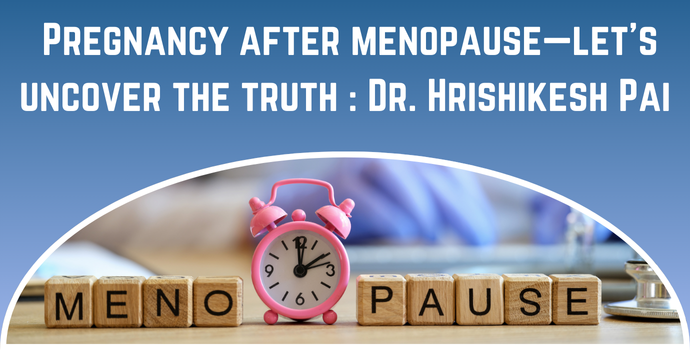The dream of motherhood doesn’t have to end with menopause.
With over 40 years of pioneering fertility work, Dr. Hrishikesh Pai, a renowned IVF doctor in Mumbai and Medical Director at Bloom IVF, has helped countless women achieve motherhood—even after menopause. His breakthroughs in assisted laser hatching and oocyte freezing have expanded possibilities for older women to conceive safely and successfully.
“Age shouldn’t limit hope. Thanks to advanced IVF techniques, postmenopausal women now have viable options to become mothers,” says Dr. Pai.
So, how long after menopause can pregnancy happen—and how?
Let’s break it down.
What Happens to Fertility During and After Menopause?
Menopause signals the end of a woman’s natural reproductive cycle, usually occurring between ages 45 and 55. It’s diagnosed when a woman hasn’t had a menstrual period for 12 consecutive months.
But what’s happening internally?
- Ovaries stop releasing eggs
- Estrogen and progesterone levels drop
- Uterine lining thins and ovulation ceases
💡 You’re probably wondering why this matters. Because these hormonal and physiological changes make natural pregnancy nearly impossible after menopause. However, thanks to IVF after menopause, motherhood is still within reach for many.
For instance, at Bloom IVF, the success rate for IVF in older women is about 40–50% per cycle—an extraordinary number for this age group.
Want more info? Explore this detailed source on menopause and fertility from the Cleveland Clinic.
Want to explore fertility options post-menopause?
Speak with Dr. Hrishikesh Pai, and discover your personalized plan at Bloom IVF today!
Can You Get Pregnant After Menopause Naturally?
Let’s be honest—this is the big question.
While it’s extremely rare, pregnancy naturally after menopause is not entirely impossible, especially during perimenopause when ovulation may still occur sporadically. But once a woman reaches postmenopause, the ovaries stop releasing eggs, making natural conception biologically unfeasible.
So, what’s the solution?
⭐ IVF using donor eggs.
This method bypasses the need for natural ovulation. Hormone therapy prepares the uterus, and a healthy donor egg is fertilized and implanted.
Here’s the good news: Bloom IVF’s state-of-the-art technologies—including vitrification and IMSI—have helped women in their late 40s and early 50s become mothers through postmenopausal pregnancy.
Signs of Pregnancy After Menopause
Now here’s the twist—many signs of pregnancy mimic menopause symptoms. That’s why it’s easy to overlook them.
Here’s what to look for:
● Missed periods (though already irregular or absent)
● Nausea or vomiting
● Breast tenderness
● Fatigue or mood swings
● Frequent urination
● Light spotting
🔎 Still unsure? A simple blood test for hCG or a pelvic ultrasound can confirm pregnancy. Always consult a fertility expert—especially if undergoing hormone therapy for pregnancy.
Experiencing unusual symptoms after menopause?
Book your consultation with Dr. Hrishikesh Pai – an IVF Doctor in Mumbai for advanced postmenopausal care.
Is Pregnancy After Menopause Risky?
Let’s face it—age comes with added responsibility, especially in pregnancy.
Postmenopausal pregnancies, particularly those via IVF, can be safe and successful—but they do carry risks:
Potential Risks Include:
- Gestational diabetes
- High blood pressure or preeclampsia
- Preterm labor or low birth weight
- Placenta previa
- Cesarean delivery
- Miscarriage
“With proper pre-IVF screening and careful monitoring, we’ve seen excellent pregnancy outcomes in women over 50,” shares Dr. Pai.
That’s why Bloom IVF employs a multi-disciplinary approach to minimize complications and optimize maternal and fetal health.
Conclusion
Here’s the bottom line:
Natural pregnancy after menopause is almost impossible—but science has created new avenues. Thanks to IVF after menopause, hormone therapy for pregnancy, and expert-guided fertility treatments, many women in their 40s and 50s are now celebrating motherhood.
Whether you’re 2 years or 10 years postmenopausal, Dr. Hrishikesh Pai and his expert team at Bloom IVF can help you navigate your journey with personalized, compassionate care. As the Best IVF Doctor in India, his innovation and patient-first approach have transformed lives across the globe.
Don’t let menopause be the end. With Bloom IVF, it can be the beginning of a new chapter.
Ready to start your motherhood journey after menopause?
Consult Dr. Hrishikesh Pai – Award-winning IVF Doctor in Mumbai – and discover the possibilities of postmenopausal pregnancy today!
Frequently Asked Questions
1. Can a woman get pregnant 5 years after menopause?
Yes, through IVF with donor eggs. Natural conception is not possible, but medically assisted pregnancy can still be achieved.
2. What is the age limit for IVF after menopause?
Most clinics set an upper limit between 50–55 years. However, patient health and uterine readiness are more important factors than age alone.
3. Is hormone therapy safe for pregnancy after menopause?
Yes, when supervised by experts. Hormone therapy is essential for preparing the uterine lining to receive the embryo.
4. Can I use my own eggs after menopause?
Generally, no. By menopause, egg reserves are depleted. However, if eggs were frozen earlier, they can be used via IVF.
5. Are there emotional challenges with late pregnancy?-age (SGA)?
Definitely. Emotional readiness, energy levels, and societal factors must be considered. Many women benefit from counseling and support groups.
References:
1. Mayo Clinic
Menopause and Pregnancy: Can I Get Pregnant After Menopause?
URL: https://www.mayoclinic.org/diseases-conditions/menopause/expert-answers/menopause-and-pregnancy/faq-20058304
Description: Trusted medical resource detailing menopause symptoms and the biology behind fertility post-menopause.
2. Cleveland Clinic
Menopause: Symptoms, Causes, and Treatments
URL: https://my.clevelandclinic.org/health/diseases/15256-menopause
Description: Offers a comprehensive breakdown of how menopause affects the reproductive system and available treatments.
3. American Society for Reproductive Medicine (ASRM)
Guidelines on Fertility Preservation and Postmenopausal Pregnancy
URL: https://www.asrm.org/
Description: The leading professional organization offering evidence-based guidance on reproductive technologies, including IVF after menopause.
4. National Institutes of Health (NIH)
Fertility After 40: Assisted Reproductive Technologies
URL: https://www.ncbi.nlm.nih.gov/pmc/articles/PMC7980167/
Description: In-depth research article reviewing success rates and risks of ARTs in postmenopausal women.

